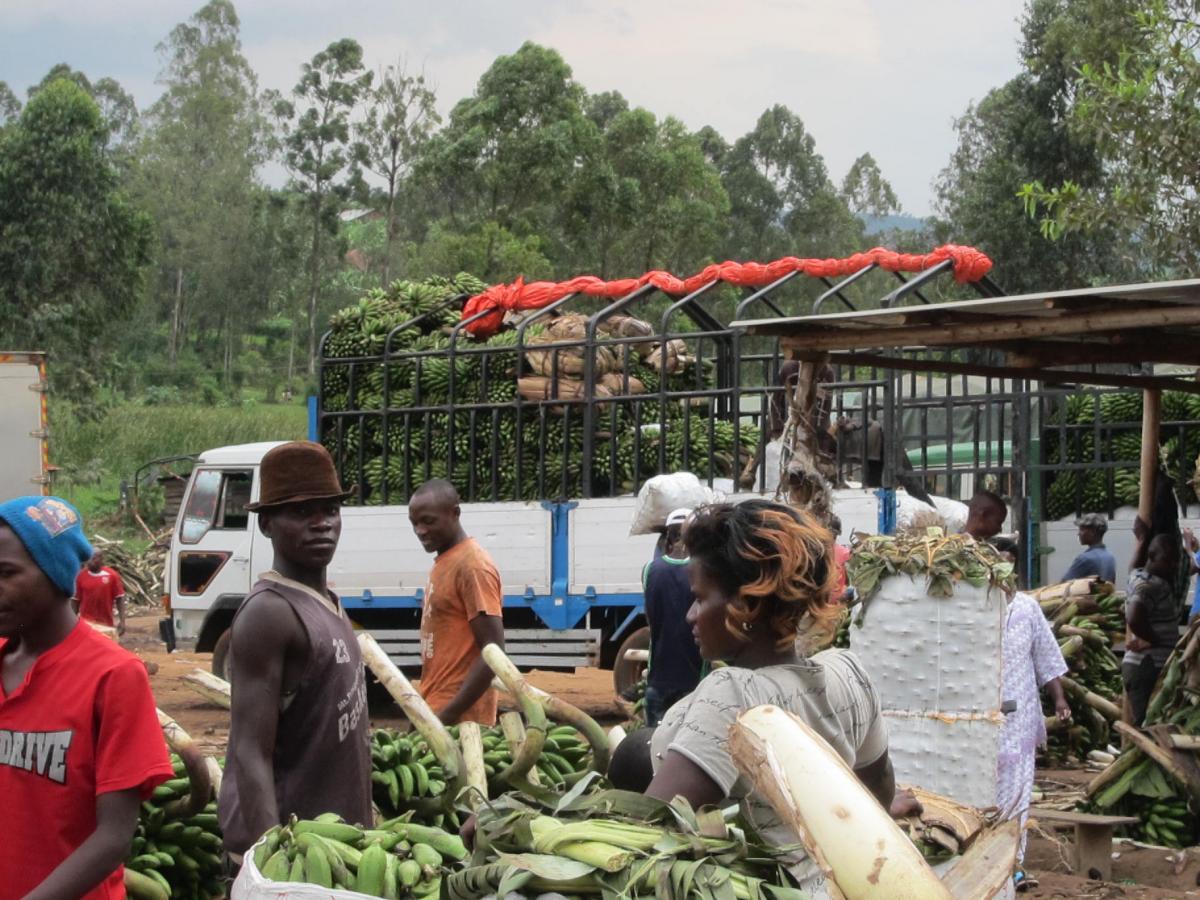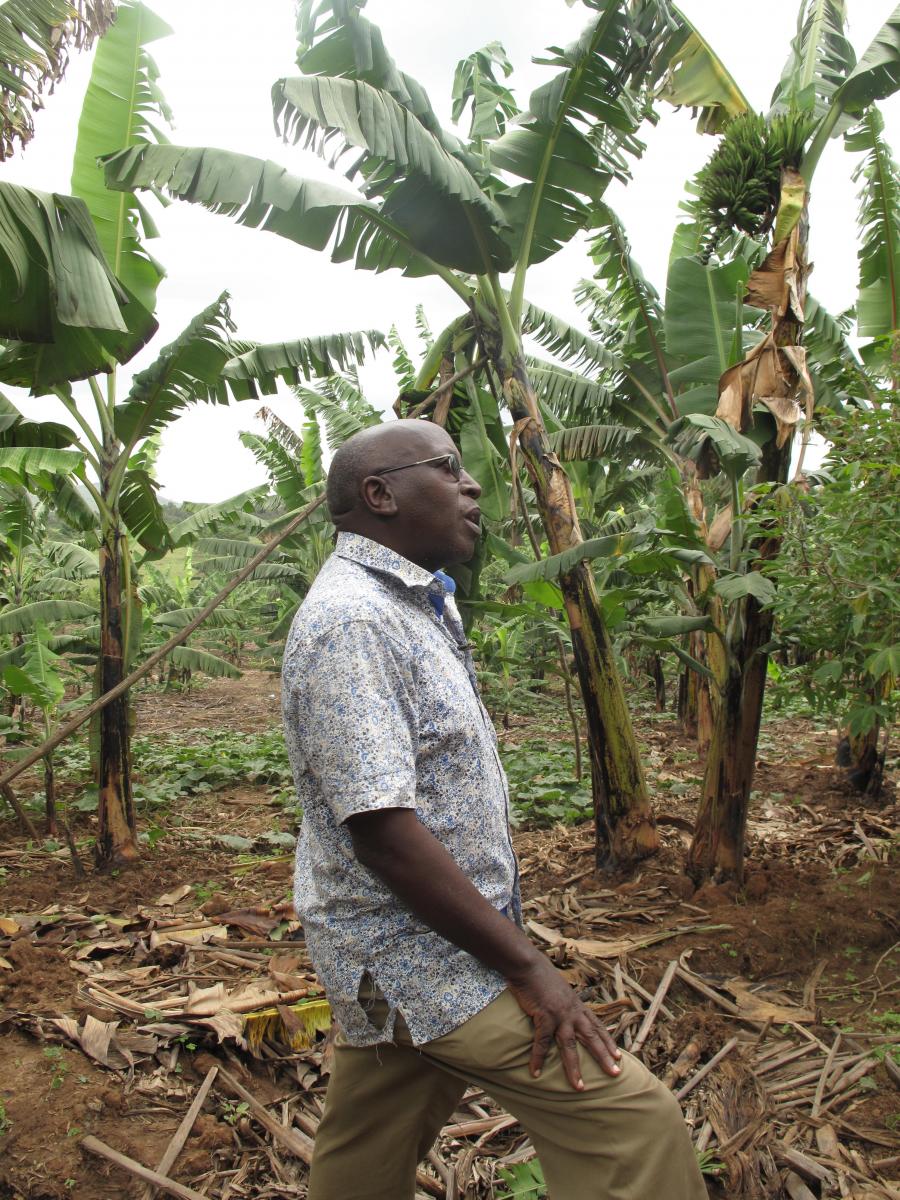
Uganda s agricultural sector has welcomed the nation s recently approved biosafety law, viewing biotechnology as a way to help stymie losses of key staple crops amounting to over US$400 million annually.
Farmers growing the important food crops of banana, cassava, maize and rice all stand to benefit from genetic engineering, which can address serious disease and pest problems that are significantly reducing yields, researchers said.
The biosafety law that Parliament approved on Oct. 4 will regulate commercial release of GE crops, said Christopher Kibanzanga, Uganda s Minister for Agriculture. As a result, the nation s agriculture sector is going to receive better crop technologies that Ugandan molecular biologists have developed over the last 10 years. The law is going to protect, but also supervise, our scientists to do their work. The ultimate beneficiary shall be the public.
Dr. Arthur Tugume, who leads the biotechnology training program at Makerere University, agreed. The law is an opportunity for us to demonstrate that indeed we meant well, contrary to horrible accusations we suffered for nearly a decade. It s an opportunity for the government to invest in scientists local innovations to grow.
Deborah Wendiro, head of microbiology/biotechnology at the state-run Uganda Industrial Research Institute (UIRI), said the new law will help revitalize biotech research and the nation s economy, spawning multiplier effects and social economic transformation. Who could continue investing where there is no value? Government investments in agricultural biotechnology had become tokens for playtime! Biotech scientists had become liabilities and not assets. It had become painful to be a scientist, almost like a curse!
Dr. Denis Kyetere, executive director of the African Agricultural Technology Foundation (AATF), said that Uganda now stands out as a leader in advanced agricultural research on the continent, and other nations will be watching how it utilizes a legal framework for advancing better crop technologies. Many nations are waiting to learn from Uganda, let alone get biotech skills and products, too, he observed.
But Arthur Makara, executive director of the Science Foundation for Livelihoods and Development (SCIFODE) and a plant scientist who specializes in tissue culture, warned that the law is a red card to anti-science propagandists who have made it a habit to mislead policy-makers while pushing for their own selfish agenda of soliciting donor funds. Activists pretend to fight for food security and poverty among the vulnerable small-scale farmers in Africa without providing real solutions, except a lot of rhetoric, he said.
Currently, crop losses are highest in bananas, with some US$299.6 million lost each year to the lethal Banana Bacterial Wilt (BBW) disease. Banana is a key food and income security crop in Uganda, which is the globe s second-highest producer, after India.
Over 13 million Ugandans consume banana especially the cooking type known locally as matooke as a main food daily. Some 75 percent of the country s farmers grow this popular fruit crop, and hundreds of thousands of others depend on it for employment in fields, transportation, markets and food processing. The nation s 17-year-old BBW disease-infestation is threatening to wipe out this useful crop, and traditional conventional breeding methods haven t been able to produce a BBW-resistant variety.
Nelson Tukundane, communication officer for the umbrella Uganda National Farmers Federation (UNFFE), recalled how his family lost 18 acres of bananas to BBW between 2010 and 2013 and has never recovered from the loss. My family relied heavily on the bananas for food and income, he said. My father used to pay school fees from banana sales. We painfully adjusted to other means of survival, but thousands of other farmers continue to suffer the same way.

Cassava, an important tuber crop, is being ravaged by twin viruses the Cassava Mosaic Virus (CMV) and Cassava Brown Streak Virus (CBSV) which are now constraining yields and causing tuber-rot, respectively. Some 75 percent of Uganda s farmers grow cassava, while nearly a third of the nation s 38 million citizens consume it as a staple food.
With the introduction of cassava genetically engineered to resist these viruses, among other efforts, Uganda could realize an annual production increase to 30 million tons from the current disease-constrained 6.7 million tons, according to statistics compiled by local and international agricultural research agencies.
Maize farmers are dealing with the stem-borer pest, which results in a 30 percent annual yield loss, as well as drought, which causes an estimated loss of US$19.4 million annually. Researchers with the Water Efficient Maize for Africa (WEMA) project have developed a stacked-gene maize variety that resists both pests and drought.
Total economic benefits from adopting GM maize is estimated at US$25.4 million ., states the joint study-report by the state-run National Agricultural Research Organization (NARO); Uganda Biosciences Information Centre (UBIC); Kilimo Trust, the International Food Policy Research Institute (IFPRI); Virus-Resistant Cassava for Africa (VIRCA)-Plus Project; and the Cassava Value-Addition in Africa (CAVA), a project of the Kampala-based Africa Innovations Institute.
Some 86 percent of Ugandan farmers grow maize, earning total revenues of US$51 million in 2015, according to the Bank of Uganda. The average yield for Ugandan farmers is 2.7 tons per hectare, compared to the 9 tons per hectare yield obtained in plots managed by WEMA researchers.
Uganda is also rapidly adopting the cultivation of rice, leading to a drop in rice imports that annually saves the country about US$30 million in foreign exchange earnings. To help boost production, NARO is developing a genetically engineered Nitrogen-use Efficient, Water-use Efficient and Salt-Tolerant (NEWEST) rice variety. Its adoption is estimated to provide economic benefits of US$19.9 million, according to the consortiums report.
Kibanzanga is a member of Parliament from the Bundibugyo District as well as a farmer. He said that agricultural sciences and farming practices must advance if Uganda is to mitigate and adapt to the new challenges presented by global climate change.
In many parts of Uganda that used to be fertile, soils have been heavily depleted of fertility by farmer ignorance in cultivation, torrential rains and erosions, he said. We re rebuilding cooperatives that will offer farmer-training and mobilization on securing loans for inputs [such as fertilizers, pesticides, machinery like tractors and irrigation] and markets.
Kibanzanga recently told an Agricultural Biotechnology and Biosafety Communication (ABBC) for Africa conference, held in Entebbe, that modern-biotechnology will be a major new game-changer in the continent s agriculture. It has to be integrated into existing systems, he said.
Tukundane agreed. This era of climate change which is an unprecedented mix of challenges requires especially powerful technologies in our crops, if we farmers are to survive, he told the Alliance for Science. We must appreciate innovations by our researchers. Modern biotechnology is one such innovative tool that has revolutionized the way our scientists breed resilience in our crops against new and emerging diseases, pests and drought.
Alhaji Maudo Jallow, a West African representative in the United Nations Food and Agriculture Organization (FAO), concurred. We have climate change now negatively impacting agriculture, and this global phenomenon ushers in a conducive environment for the escalation of pests, persistent and prolonged dry spells and water stresses to humans, crops, livestock and fisheries. Therefore preparedness to these and other challenges is a must.
But the availability of improved seeds also needs to be accompanied by supportive policies, farmer education and technical, financial and human resources for crop-improvement in order for Uganda s agricultural productivity and production to thrive, Jallow said.
Peter Wamboga-Mugirya is a 2015 Alliance for Science Global Leadership Fellow from Uganda.
